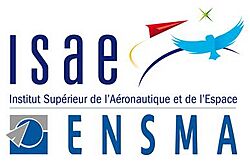École nationale supérieure de mécanique et d'aérotechnique facts for kids
 |
|
| Type | Grande Ecole |
|---|---|
| Established | 1948 |
| President | Jean-Pierre Métivier (Airbus France) |
| Director | Roland Fortunier |
| Location |
Chasseneuil-du-Poitou, near Poitiers
,
,
France
|
The École Nationale Supérieure de Mécanique et d'Aérotechnique (often called ISAE-ENSMA) is a special engineering school in France. It was started in 1948 and is located near Poitiers.
This school is known for training engineers, especially in areas like aerospace. Many students who graduate from ISAE-ENSMA go on to work as engineers in companies that build airplanes, rockets, cars, or energy systems. It is part of a group of top aerospace schools called the ISAE group.
Contents
History of ISAE-ENSMA
How the School Started
In 1945, a school called the Institut de Mécanique et d’Aérotechnique de Poitiers (IMAP) was created. It was a team effort between the French Air Ministry and two universities.
Then, in 1947, the French government decided to create new national engineering schools. As part of this plan, IMAP officially became the École nationale supérieure de mécanique et d'aérotechnique (ENSMA) on March 27, 1948.
Growing and Moving
In 1986, ENSMA became a public institution. This meant it was recognized as important for the public good. It was connected with the University of Poitiers.
Later, in 1993, ENSMA moved from the center of Poitiers to Futuroscope. This move gave the school a much bigger campus. It also allowed for more space for important research.
Joining the ISAE Group
In 2011, ENSMA helped create a network of engineering schools called the Groupe ISAE. They teamed up with another big aerospace school, the Institut Supérieur de l'Aéronautique et de l'Espace (ISAE). After joining this group, the school started using its current name, ISAE-ENSMA.
By 2017, ISAE-ENSMA became a fully independent school. This means it has its own legal, administrative, and financial control within the French education system.
How to Get In
For French Students
If you are a student in France, getting into ISAE-ENSMA is quite competitive. Students usually take a national exam after finishing special "preparatory classes." These classes are a two or three-year science program. They focus on subjects like Math, Physics, Chemistry, and Engineering.
After passing the exam and being accepted, students then complete a three-year program at ISAE-ENSMA.
For International Students
If you want to join a master's program at ISAE-ENSMA, you usually need to have a Bachelor’s degree. It's best if your degree is in mechanical, aerospace, or mechatronics engineering.
What You Can Study
ISAE-ENSMA offers several exciting programs for future engineers.
Engineering Degree (Diplome d'Ingenieur)
This is a three-year program. It's like getting a Master of Science degree in Mechanical Engineering and Aerotechnics.
- First Two Years: Students take required classes. These include science subjects like math and physics. They also learn about engineering topics such as:
* How things move (mechanics) * How fluids behave (fluid mechanics) * How structures are built * Materials science * Heat and energy (thermodynamics, heat transfer) * Engines (propulsion) * Computer science * And more! They also study management, humanities, and foreign languages.
- Third Year: Students choose a special area to focus on:
* Aerodynamics, Energy, and Heat Science * Materials and Structure Engineering * Computer Science
Master of Science Programs
The school also offers two Master of Science (MSc) degrees:
- MSc in Aeronautical Mechanics & Energy (AME)
- International MSc in Turbulence (this is a joint program with other schools)
Masters with Poitiers University
ISAE-ENSMA also partners with Poitiers University for three other Master's programs:
- Space and Aerospace (focusing on transportation, mechanics, and turbulence)
- High Performance Materials
- Computer Science
International Partnerships
ISAE-ENSMA works with many universities around the world. These partnerships allow students to do things like:
- Earn two degrees (double degrees)
- Study abroad for a while (exchanges)
- Work together on research projects
Research at ISAE-ENSMA
ISAE-ENSMA is a place where important research happens. Two main research labs are connected to the school:
- Institut Pprime: This lab focuses on energy and materials. It works with the French National Centre for Scientific Research (CNRS). In 2014, it was one of the largest engineering science labs in France.
* It has three main parts: * Physics and Mechanics of Materials * Fluids, Heat, and Combustion Sciences * Mechanics, Structures, and Complex Systems
- LIAS: This lab focuses on electronics, computer science, and automation.
* It has three teams: * Data and Models Engineering * Embedded Real-Time Systems * Automatic Control & Systems
Key Research Topics
The main research areas at ISAE-ENSMA include:
- How air and other fluids move (turbulence, aerodynamics)
- How things burn and explode (combustion and detonation)
- How materials and structures behave and last over time
- Designing computer systems that are built into other devices (embedded systems)
- Controlling how heat moves
Notable Alumni
Some well-known people who studied at ISAE-ENSMA include:
- Lionel Guérin, who founded an airline called Airlinair.
- Sébastien Guingo, an executive officer for the Ariane 6 rocket design.
- Hervé Stevenin, a European aquanaut who leads operations for the European Space Agency.
- Jacques Santrot, a former Mayor and Deputy.
See also
 In Spanish: École nationale supérieure de mécanique et d'aérotechnique para niños
In Spanish: École nationale supérieure de mécanique et d'aérotechnique para niños
 | Selma Burke |
 | Pauline Powell Burns |
 | Frederick J. Brown |
 | Robert Blackburn |

